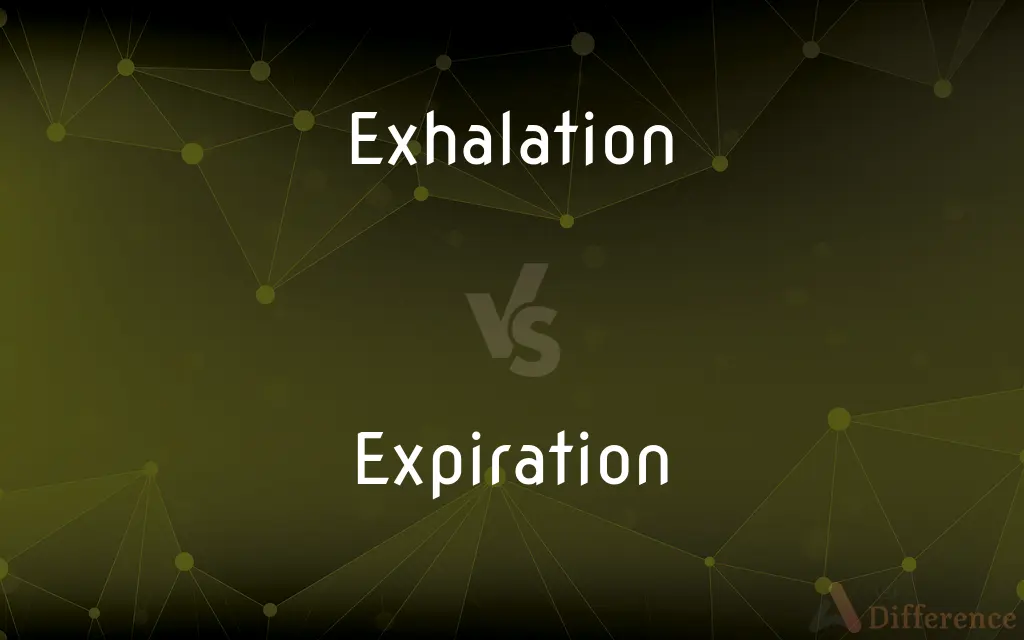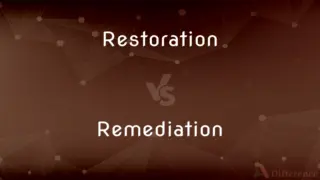Exhalation vs. Expiration — What's the Difference?
By Maham Liaqat & Fiza Rafique — Updated on April 15, 2024
Exhalation is the act of breathing out air from the lungs, typically in a natural, passive manner; expiration, however, can also refer to the act of expiring or coming to an end.

Difference Between Exhalation and Expiration
Table of Contents
ADVERTISEMENT
Key Differences
Exhalation involves the release of air from the lungs, an essential part of the respiratory process. Whereas, expiration can also imply the act of something ceasing or concluding, such as a subscription or a life.
In physiological terms, exhalation is a biological process crucial for carbon dioxide removal and oxygen exchange. On the other hand, expiration in a broader context encompasses the end of a period or effectiveness, like a product's shelf life.
During exhalation, the diaphragm relaxes and the lung volume decreases, pushing air out. In contrast, expiration might not relate to physical processes but rather to time-bound conditions in various contexts.
The term 'exhalation' is usually used in a biological or health-related context. Whereas, the term 'expiration' is frequently used in legal, medical, or general contexts to denote the end.
While exhalation is specifically about the outward flow of air, expiration's dual meaning includes a biological aspect and a metaphorical or practical aspect concerning the end of an event or condition.
ADVERTISEMENT
Comparison Chart
Definition
Act of breathing out air from the lungs
Act of expiring or the end of a period
Context
Biological, health
Biological, legal, general, practical
Process in Physiology
Relaxation of the diaphragm
Can also refer to the breathing process
Usage in Sentences
Specific to breathing
Broader, includes usage like expiry dates
Connotation
Natural, involuntary action
Often associated with ending or ceasing
Compare with Definitions
Exhalation
Release of air from the lungs.
Exhalation helps remove excess carbon dioxide from the body.
Expiration
Breathing out in a biological context.
Expiration is as vital as inhalation in breathing.
Exhalation
A passive biological process.
Exhalation occurs naturally when the diaphragm relaxes.
Expiration
The end of a fixed period.
The expiration date on the milk carton indicates it's no longer safe to drink.
Exhalation
Part of the respiratory cycle.
Proper exhalation is crucial for effective speech.
Expiration
The act of dying or conclusion of life.
The patient's expiration was recorded at midnight.
Exhalation
Involuntary expulsion of air.
His sudden exhalation was a sign of relief.
Expiration
Termination or conclusion of an agreement.
They awaited the expiration of the contract to negotiate new terms.
Exhalation
Act of breathing out.
The yoga instructor focused on the rhythm of inhalation and exhalation.
Expiration
Ceasing to be valid, as in a license.
The expiration of his driver's license was overlooked.
Exhalation
Exhalation (or expiration) is the flow of the breath out of an organism. In animals, it is the movement of air from the lungs out of the airways, to the external environment during breathing.
Expiration
The ending of the fixed period for which a contract is valid
The expiration of the lease
Exhalation
The act or an instance of exhaling.
Expiration
The exhalation of breath from the lungs
At the end of expiration there is still a slight inflation in the lungs
Exhalation
Something, such as air or vapor, that is exhaled.
Expiration
The act of coming to a close; termination
The expiration of a contract.
Exhalation
The act or process of exhaling; breathing out
Short exhalations of breath
Expiration
The act of expiring.
Exhalation
That which is exhaled, or which rises in the form of vapor, fume, or steam
Exhalations from the earth or flowers
Expiration
The act or process of breathing out, or forcing air from the lungs through the nose or mouth
Respiration consists of inspiration and expiration
Exhalation
A bright phenomenon; a meteor.
Expiration
Emission of volatile matter; exhalation.
Exhalation
The act or process of exhaling, or sending forth in the form of steam or vapor; evaporation.
Expiration
A cessation, extinction, ending
Exhalation
That which is exhaled, or which rises in the form of vapor, fume, or steam; effluvium; emanation; as, exhalations from the earth or flowers, decaying matter, etc.
Ye mists and exhalations, that now riseFrom hill or steaming lake.
Expiration
That which is produced by breathing out, as a sound.
Exhalation
A bright phenomenon; a meteor.
I shall fallLike a bright exhalation in the evening.
Expiration
The act of expiring
The true cause of cold is an expiration from the globe of the earth.
Exhalation
Exhaled breath
Expiration
That which is expired; matter breathed forth; that which is produced by breathing out, as a sound.
The aspirate "he," which is . . . a gentle expiration.
Exhalation
The act of expelling air from the lungs
Expiration
A coming to a close; cessation; extinction; termination; end.
Before the expiration of thy time.
Expiration
A coming to an end of a contract period;
The expiry of his driver's license
Expiration
The act of expelling air from the lungs
Common Curiosities
Can expiration refer to something other than breathing?
Yes, expiration is often used to indicate the end of validity or effectiveness, like a passport's expiry.
What is exhalation?
Exhalation is the process of breathing out air from the lungs.
How does understanding exhalation benefit medical practices?
Understanding exhalation is crucial in fields like pulmonology and anesthesiology, as it helps in managing ventilation and respiratory therapies effectively.
How are exhalation and expiration related in biology?
Both terms can refer to the act of breathing out, though expiration is less commonly used in this context.
Is there a difference in the frequency of use between exhalation and expiration in medical terminology?
In medical terminology, "exhalation" is more frequently used to describe the act of breathing out, whereas "expiration" might be used in a broader context, including the end of life or the cessation of biological functions.
Is exhalation an active or passive process?
Exhalation is generally a passive process where the lungs deflate without muscular effort.
What physiological changes occur during exhalation?
During exhalation, the diaphragm relaxes, and the chest cavity decreases in size, forcing air out of the lungs.
What are common uses of the term "expiration" outside of biology?
Outside of biology, "expiration" is commonly used to describe the end of a document's validity, such as a contract, subscription, or official document like a passport.
What does expiration mean?
Expiration can refer to the act of expiring, either in a physiological or metaphorical context, such as the end of a period.
What metaphorical uses does "expiration" have in language?
Metaphorically, "expiration" is used to describe the end of something's relevance or functionality, often used in phrases like "expiration of an idea" to denote its obsolescence or end of usefulness.
Share Your Discovery

Previous Comparison
Restoration vs. Remediation
Next Comparison
Insurrection vs. ResurrectionAuthor Spotlight
Written by
Maham LiaqatCo-written by
Fiza RafiqueFiza Rafique is a skilled content writer at AskDifference.com, where she meticulously refines and enhances written pieces. Drawing from her vast editorial expertise, Fiza ensures clarity, accuracy, and precision in every article. Passionate about language, she continually seeks to elevate the quality of content for readers worldwide.














































